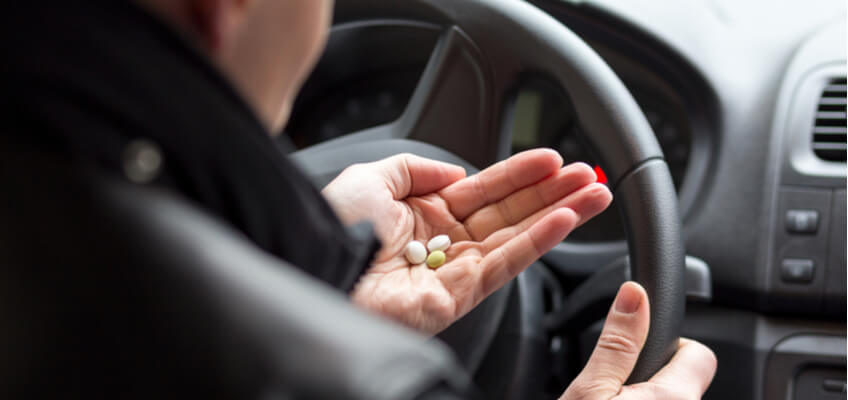Drug driving convictions can carry long-term sentences as well as staying on your driving record for up to 11 years. This can affect how car insurers see you and will often lead to higher insurance premiums.
In This Guide:
What are the different kinds of drug driving convictions?
As with drink driving charges, drug driving offenses sit in different categories depending on the severity of the offense. Each charge will stay on your driving record for a fixed amount of time and most for up to 11 years. The different drug driving charges, their codes, and the number of points taken from your license are as follows.:
- DR80 - Driving or attempting to drive when unfit through drugs. Will stay on your record for 11 years and earn 3-11 points on your license.
- DG10 - Driving or attempting to drive with drug level above the specified limit. Will stay on your record for 11 years and earn 3-11 points on your license.
- DG30 - Causing death by careless driving with drug level above the limit. Will stay on your record for 11 years and earn 3-11 points on your license.
- DR90 - In charge of a vehicle when unfit through drugs. Will stay on your record for 4 years and earn 10 points on your license.
Even if a person is convicted for the most minor drug driving violation, car insurers will likely see you as an unsafe driver and charge higher premiums. This is also true for those with drink driving convictions, such as a DR10 charge.
Prescription drugs and driving

You’re allowed to drive on prescription drugs both if a doctor has prescribed them for you and doing so doesn’t go against any medical advice. If you’re impacted by prescription drugs to the extent it affects your driving or puts you over the legal limit, you’re breaking the law and can be charged for drug driving offenses.
New laws introduced in 2015 mean that prescription drugs, many of which are stimulants, opioids, or sedatives, are only legal if very low quantities are found in the bloodstream. Examples of such drugs are: clonazepam, diazepam, flunitrazepam, lorazepam, methadone, morphine, oxazepam, and temazepam.
Side effects of these drugs can include blurred vision, loss of concentration, slower reaction times, poor judgement, and increased confidence and risk-taking, all of which can negatively impact your driving. Getting caught with unsafe levels of these drugs in your system will often lead to points being deducted from your license as well as convictions, all of which impact your car insurance cost.
Illegal drugs and driving
With illegal drugs, only very low limits in the bloodstream are permissible when it comes to driving – so low that it’d be considered as accidental exposure. This is the case even if your driving isn’t impacted, and if stopped by the police you could be charged for drug driving offenses such as DR90 or DG10.
Examples of such illegal drugs include, but not limited to: cannabis, cocaine, ketamine, heroin, LSD, MDMA, and methamphetamine.
How do drug driving convictions affect car insurance premiums?
You must notify your insurance provider immediately if you’re issued with a drug driving conviction. Insurance for convicted drivers becomes more expensive. This is because insurers view you as statistically higher risk. Further still, you’ll likely have a tough time finding an insurer to cover you, as many companies will simply refuse to do so if you have an offence. This can make it tricky if you are trying to find cheap car insurance.
If you’re issued with a driving ban, typically lasting a minimum of one year, then it may be cheaper to declare your vehicle as off-road, rather than continuing to pay for car insurance.





